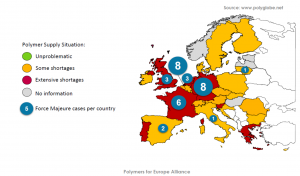
European plastics industry faces extreme raw materials shortages, price increases, association says
Canadian Plastics
Economy Market Forecast Materials COVID-19The situation threatens the economic survival of numerous SMEs and endangers the production of a wide range of products, the European Plastics Converters group says.
As a result of the ongoing COVID-19 pandemic, the European plastics converting industry is facing severe shortages of raw materials and extreme price increases never before experienced, according to the European Plastics Converters (EuPC) trade organization – a situation that threatens the economic survival of numerous SMEs and endangers the production of products ranging from applications in the building and automotive industry to essential goods for the food packaging and pharmaceutical supply chains.
“Manufacturers of plastic products all over Europe are experiencing serious bottlenecks in the supply of raw materials since the beginning of this year,” EuPC managing director Alexandre Dangis said in an April 13 statement. “Delivery problems have become increasingly widespread, affecting raw materials for example (not limited) such as polypropylene, PVC, and polyethylene, as well as special additives that are crucial for the manufacture of compounds and plastic products.”

Image Credit: European Plastics Converters/Polymers for Alliance Europe
The serious market disruptions currently taking place all over Europe are a symptom of the structural imbalance in Europe between the local production of and demand for raw materials and additives, EuPC said. “Without restoration of that balance, periodic recurrence of gross disruption of the production chain is highly likely,” it said. “Ultimately, end customers will also suffer damage due to disruptions in the delivery of (semi-)finished products.”
Europe is a net importer for polymer raw materials and is therefore above-average vulnerable to market disruptions, the news release said. “The current shortages are caused by the improving global economy in combination with exports of plastics from Europe to Asia and North America,” it said. “Logistical problems due to a shortage of containers to Europe also contribute, as does the lower production of plastics in the U.S. Furthermore, the demand for certain raw materials used for protective articles against COVID-19 is extremely high.”
The more than 50,000 SMEs that form the plastics converting industry in Europe are under severe pressure, EuPC noted, still recovering from the effects of the COVID-19 pandemic and now faced with a raw material scarcity that not only dramatically increased their cost of production but threatens to stop it altogether. “Recent surveys amongst plastics converters in several Member States have shown that more than 90 per cent of them are affected by this supply crisis and many are forced to reduce their production and accept less or no new customers to be able to honour their existing agreements,” EuPC said. “If this situation continues further, the supply of essential goods for the food and pharmaceutical industries will no longer be guaranteed.”
In many cases, a switch to recycled material is only feasible to a limited extent. “In several applications, legal safety regulations, technical hurdles, and quality requirements currently prevent the wider use of recycled materials,” EuPC said. “Especially for the mentioned essential goods. Recyclates are not available in sufficient quantities and consistent quality yet. Where recyclates are established alternatives, prices are rising significantly to parallel virgin material – and availability is declining.”
Created in 1989 and based in Brussels, Belgium, EuPC is the EU-level trade association of European plastics converters, with four divisions: Packaging, Building & Construction, Automotive & Transport, and Technical Parts.
